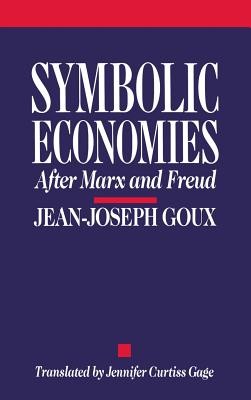
- We will send in 10–14 business days.
- Author: Jean-Joseph Goux
- Publisher: Cornell University Press
- ISBN-10: 0801420423
- ISBN-13: 9780801420429
- Format: 15.2 x 22.9 x 1.9 cm, hardcover
- Language: English
- SAVE -10% with code: EXTRA
Reviews
Description
A major participant in the influential Tel Quel group in France, Jean-Joseph Goux here offers a bold reevaluation of both the Marxist economic model and the Freudian concept of the unconscious. Symbolic Economies makes available for the first time in English generous selections from Goux's Freud, Marx: Economie et symbolique (1973) and Les iconoclastes (1978). Goux brings the theories of historical materialism and of psychoanalysis into play to illuminate and enrich each other, and undertakes a compelling integration of the contributions of structuralism and post-structuralism. Looking closely at the work of such major figures as Lacan, Derrida, and Nietzsche, Goux extends the implications of Marxism and Freudianism to an interdisciplinary semiotics of value and proposes a radical concept of exchange. Literary theorists, philosophers, social scientists, cultural historians, and feminist critics alike will welcome this important and provocative work.
EXTRA 10 % discount with code: EXTRA
The promotion ends in 16d.21:52:18
The discount code is valid when purchasing from 10 €. Discounts do not stack.
- Author: Jean-Joseph Goux
- Publisher: Cornell University Press
- ISBN-10: 0801420423
- ISBN-13: 9780801420429
- Format: 15.2 x 22.9 x 1.9 cm, hardcover
- Language: English English
A major participant in the influential Tel Quel group in France, Jean-Joseph Goux here offers a bold reevaluation of both the Marxist economic model and the Freudian concept of the unconscious. Symbolic Economies makes available for the first time in English generous selections from Goux's Freud, Marx: Economie et symbolique (1973) and Les iconoclastes (1978). Goux brings the theories of historical materialism and of psychoanalysis into play to illuminate and enrich each other, and undertakes a compelling integration of the contributions of structuralism and post-structuralism. Looking closely at the work of such major figures as Lacan, Derrida, and Nietzsche, Goux extends the implications of Marxism and Freudianism to an interdisciplinary semiotics of value and proposes a radical concept of exchange. Literary theorists, philosophers, social scientists, cultural historians, and feminist critics alike will welcome this important and provocative work.


Reviews